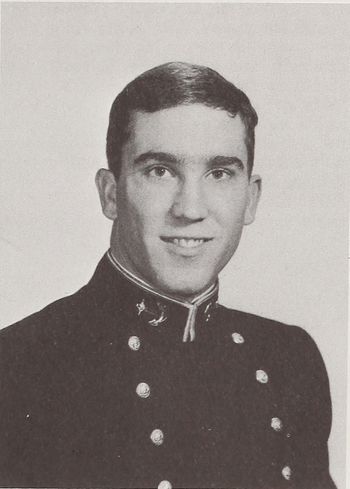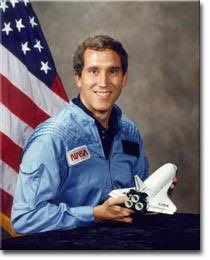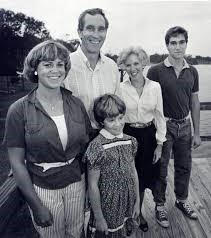MICHAEL J. SMITH, CAPT, USN
Michael Smith '67
Lucky Bag
From the 1967 Lucky Bag:
MICHAEL JOHN SMITH
Beaufort, North Carolina
Hailing from Beaufort, North Carolina, Mike entered USNA immediately upon graduation from high school. A hard worker and a gifted student, Mike has excelled whether it be in the classroom or on the athletic field. On the athletic field, Mike helped anchor the consistently strong Sixth Battalion football team. During the winter he has divided his time between the weight room and the boxing ring, while in the spring he relaxes by participating in the Softball league. Mike's friendly smile and goodnatured personality have aided him in developing many close friendships while here at USNA. With these attributes, Mike is certain to be a success in any field, be it in or out of the Navy.
He was also a member of the 35th Company staff (fall).

MICHAEL JOHN SMITH
Beaufort, North Carolina
Hailing from Beaufort, North Carolina, Mike entered USNA immediately upon graduation from high school. A hard worker and a gifted student, Mike has excelled whether it be in the classroom or on the athletic field. On the athletic field, Mike helped anchor the consistently strong Sixth Battalion football team. During the winter he has divided his time between the weight room and the boxing ring, while in the spring he relaxes by participating in the Softball league. Mike's friendly smile and goodnatured personality have aided him in developing many close friendships while here at USNA. With these attributes, Mike is certain to be a success in any field, be it in or out of the Navy.
He was also a member of the 35th Company staff (fall).
Loss
Mike was pilot of the Space Shuttle Challenger when it was destroyed on January 28, 1986.
Other Information
From the April 1986 issue of Shipmate:
Cdr. Michael John Smith USN was killed in the explosion which destroyed the space shuttle Challenger at Cape Canaveral, Florida on 28 January 1986. The accident, which was witnessed by millions viewing the lift-off on national TV, took the lives of all seven crew members aboard Challenger.
Commander Smith and his fellow astronauts were honored at a memorial service held in Houston, Texas, on 31 January; that service was attended by President and Mrs. Reagan. "For those who knew you well and loved you," the President said, "the pain will be deep and enduring. A nation, too, will long feel the loss of her seven sons and daughters...."
A memorial service for Commander Smith was also held that same day at the Naval Academy Chapel and was attended by the Brigade, and Navy people in the Annapolis area.
Born in North Carolina, Commander Smith was appointed to the Naval Academy from that state and graduated with the Class of 1967. He also earned a master's degree from the Postgraduate School in Monterey, Calif.
Following a combat cruise in Vietnam, he trained as a test pilot at Patuxent River. In 1980, six years after completing Test Pilot School, he was selected as an astronaut. The ill-fated Challenger Flight was his first space mission.
He is survived by his wife, the former Jane Jarrell of Charlotte, N.C., and their three children, Scott, 17, Allison, 14, and Erin, 8.
From the Class of 1967's 50th Reunion Yearbook, courtesy of William Belden '67:
Mike was born April 30, 1945, in Beaufort, North Carolina. He graduated from Beaufort High School in 1963, and went on to receive a Bachelor of Science degree in Naval Science from the United States Naval Academy in 1967. He subsequently attended the U.S. Naval Postgraduate School at Monterey, California, from which he graduated with a Master of Science degree in Aeronautical Engineering in 1968. He completed naval aviation jet training at Naval Air Station Kingsville, Texas, receiving his aviator wings in May 1969. He was then assigned to the Advanced Jet Training Command (VT-21) where he served as an instructor from May 1969 to March 1971. During the 2-year period that followed, he flew A-6 Intruders and completed a tour during the Vietnam War while assigned to Attack Squadron 52 (VA-52) aboard the USS Kitty Hawk (CV-63).
In 1974, he graduated from U.S. Naval Test Pilot School and was assigned to the Strike Aircraft Test Directorate at NAS Patuxent River, Maryland, to work on the A-6E TRAM and Cruise missile guidance systems. He returned to the U.S. Naval Test Pilot School in 1976 and completed an 18-month tour as an instructor. From Patuxent River, he was assigned to Attack Squadron 75 (VA-75), where he served as maintenance and operations officer while completing two Mediterranean deployments aboard the USS Saratoga.
He flew 28 different types of civilian and military aircraft, logging 4,867 hours of flying time. He was promoted posthumously by Congress to the rank of Captain, and has had a Chair named in his honor at the U.S. Naval Postgraduate School.
Mike was selected for the astronaut program in May 1980; he served as a commander in the Shuttle Avionics Integration Laboratory (SAIL), Deputy Chief of Aircraft Operations Division, Technical Assistant to the Director, Flight Operations Directorate, and was also assigned to the Astronaut Office Development and Test Group. In addition to being pilot on the Challenger, he had been slated to pilot a future Shuttle mission (STS-61-N) that had been scheduled for the Fall of 1986.
Mike’s voice was the last one heard on the Challenger voice recorder, saying "Uh oh". It broke up 73 seconds into the flight, and at an altitude of 48,000 feet.
While analyzing the wreckage, investigators discovered that several electrical system switches on Mike’s right-hand panel had been moved from their usual launch positions. Fellow Astronaut Richard Mullane wrote, "These switches were protected with lever locks that required them to be pulled outward against a spring force before they could be moved to a new position." Later tests established that neither the force of the explosion, nor the impact with the ocean could have moved them indicating that he made the switch changes, presumably in a futile attempt to restore electrical power to the cockpit after the crew cabin detached from the rest of the orbiter.
Michael is survived by his wife, Jane, and three children. Michael enjoyed woodworking, running, tennis, and squash.
He has a memorial in Arlington National Cemetery.
Photographs
Recognition
He was posthumously awarded the Congressional Space Medal of Honor in 2004, along with all crew members lost in the Challenger and Columbia accidents. He also received the Defense Distinguished Service Medal (posthumous), the Navy Distinguished Flying Cross, 3 Air Medals, 13 Strike/Flight Air Medals, the Navy Commendation Medal with "V" Device, the Navy Unit Citation, and the Vietnam Cross of Gallantry with Silver Star.
Memorials
The Michael J. Smith Field airfield in his home town of Beaufort, North Carolina is named after Smith.
The United States Naval Academy lists the "Class of 1967 Captain Michael J. Smith, USN, Award" as one of the Academy-wide prizes and awards; it is administered by the Aerospace Engineering section.
Seven asteroids discovered by the Lowell Observatory in Flagstaff, AZ between 1980 and 1984 were named for the seven astronauts of the shuttle Challenger in March, 1986.
Additional Reading
From Heroes of the United States Naval Academy:
Michael John Smith was born on April 30, 1945 in Beaufort, North Carolina. He was an American astronaut and pilot of the Space Shuttle Challenger when it was destroyed on January 28, 1986 during the STS-51-L mission. All seven crew members died.
Michael John Smith was born on April 30, 1945 in Beaufort, North Carolina to Robert L. Smith and Lucille Safrit Smith. In 1963 he graduated from Beaufort High School and was nominated to the United States Naval Academy from North Carolina. During Second Class summer, Midshipman Smith was a plebe detailer for M Company. He was described as a major personality, funny and impressive leader. Midshipman Smith graduated 132 of 830 Midshipman on June 7, 1967.
In the 1967 Lucky Bag, Midshipman Smith’s roommate wrote:
Hailing from Beaufort, North Carolina. Mike entered USNA immediately upon graduation from high school. A hard worker and a gifted student, Mike has excelled whether it be in the classroom or on the athletic field. On the athletic field, Mike helped anchor the consistently strong Sixth Battalion football team. During the winter he has divided his time between the weight room and the boxing ring, while in the spring he relaxes by participating in the softball league. Mike’s friendly smile and good-natured personality have aided him in developing many close friendships while here at USNA. With these attributes, Mike is certain to be a success in any field, be it in or out of the Navy.
In 1968, Ensign Smith earned a Master’s Degree in Aeronautic Engineering, Space Science at Naval Post Graduate School, Monterey California.
In May 1969, LTJG Smith earned his wings and completed aviation jet training at Kingsville, Texas.
From May 1969 to March 1971, LTJG Smith was assigned as an instructor to Advance Jet Training Command (VT-21).
From 1971 to 1972 Lieutenant Smith was assigned to Attack Squadron 52 aboard the USS Kitty Hawk (CV-63) completing a Vietnam tour flying A-6 Intruders.
In 1974, Lieutenant Smith completed US Navy Test Pilot School and was assigned to the Strike Aircraft Test Directorate at Patuxent River, Maryland, to work on the A-6E TRAM and CRUISE missile guidance systems.
In 1976 LCDR Smith returned to US Navy Test Pilot School and completed an 18-month tour as an instructor.
In 1978, LCDR Smith was assigned to Attack Squadron 75, where he served as maintenance and operations officer while completing two Mediterranean deployments aboard the aircraft carrier USS Saratoga (CV-60).
In May 1980, Commander Smith was selected for the astronaut program.
In August 1981, Commander Smith completed a one year training and evaluation period with NASA. Commander Smith was assigned as Commander in the Shuttle Avionics Integration Laboratory, Deputy Chief of Aircraft Operations Division, Technical Assistant to the Director, Flight Operations Directorate, and was also assigned to Astronaut Officer of Development and Test Group.
Commander Smith was assigned as pilot on Challenger STS 51-L. He was scheduled to be the pilot of Space Shuttle Mission 61-N scheduled for launch in the fall of 1986.
On January 28, 1986, Commander Smith was killed in the line of duty when the Space Shuttle Challenger exploded after launch from the Kennedy Space Center, also taking the lives of spacecraft commander, Mr. F.R. Scobee, three mission specialists, Dr. R.E. McNair, Lieutenant Colonel E.S. Onizuka (USAF), and Dr. J.A. Resnik, and two civilian payload specialists, Mr. G.B. Jarvis and Mrs. S. C. McAuliffe.
Commander Smith's voice was the last one heard on the Challenger voice recorder, saying "Uh oh". It broke up 73 seconds into the flight, and at an altitude of 48,000 feet (14.6 km).
While analyzing the wreckage, investigators discovered that several electrical system switches on Smith's right-hand panel had been moved from their usual launch positions. Fellow Astronaut Richard Mullane wrote, "These switches were protected with lever locks that required them to be pulled outward against a spring force before they could be moved to a new position." Later tests established that neither the force of the explosion, nor the impact with the ocean could have moved them indicating that he made the switch changes, presumably in a futile attempt to restore electrical power to the cockpit after the crew cabin detached from the rest of the orbiter.
Commander Smith was quite critical of NASA's decision to scrub the scheduled January 26, 1986 launch of Challenger due to a forecast of rain. His experience as a pilot naturally led him to study the weather patterns prior to the flight, and a study of the jet stream caused him to be concerned about an approaching cold front over Cape Canaveral. Earlier, he had urged NASA technicians to complete installation of needed spare parts so the shuttle could get off the ground by January 26, 1986 at the latest. As it turned out, the expected rain never arrived, and a frustrated Commander Smith told a friend, "You know, you've got people down here making decisions who've never even flown an airplane before."
Before Challenger launched on its ill-fated STS-51L mission, the space shuttle program had completed 24 missions in a row, starting with the April 1981 liftoff of the orbiter Columbia. That run of success bred a measure of complacency, Chiao said. (NASA astronaut Leroy Chiao, who flew three space shuttle missions during his career in 1994, 1996 and 2000, and also served as commander of the International Space Station from October 2004 through April 2005.) "There was a 'launch fever' at the time, to try to get these missions off on time, and get more missions going," he said.
That type of thinking played a significant role in the disaster, experts have concluded. Challenger was lost because a rubber "O-ring" seal on the shuttle's right-hand solid rocket booster failed, allowing hot gas to escape and damage the orbiter's external fuel tank, as well as the gear that attached the booster to the tank.
The O-ring failed in part because unusually cold temperatures on launch day caused the part to harden, investigators later determined. The temperature at liftoff time was 36 degrees Fahrenheit (2 degrees Celsius) — 15 degrees F (8 degrees C) colder than any previous shuttle launch, NASA officials have said.
"The decision to launch the Challenger was flawed. Those who made that decision were unaware of the recent history of problems concerning the O-rings and the joint, and were unaware of the initial written recommendation of the contractor advising against the launch at temperatures below 53 degrees Fahrenheit (11.7 degrees C) and the continuing opposition of the engineers at Thiokol (Morton Thiokol, which built the shuttle's solid rocket boosters) after the management reversed its position," investigators wrote in their report about the disaster, which is known as the Rogers Commission Report.
"They did not have a clear understanding of Rockwell's concern that it was not safe to launch because of ice on the pad," they added. (Rockwell International built the space shuttles for NASA.) "If the decision-makers had known all of the facts, it is highly unlikely that they would have decided to launch 51L on January 28, 1986."
In a way, the accident jolted these decision-makers awake, Chiao said. "A lot of things changed," he said. "The space shuttle had to be entirely re-certified. Every last little technical piece was re-analyzed."
This work took nearly three years. The shuttle program was grounded until the orbiter Discovery blasted off on September 29, 1988.
Commander Smith was promoted posthumously by Congress to the rank of Captain.
Captain Smith’s personal decorations includes: Congressional Space Medal of Honor (posthumously), Defense Distinguished Service Medal (posthumously), Navy Distinguished Flying Cross, Navy, Air Medal (3), Strike Flight Air Medal (13), Navy Commendation Medal with Combat “V”, Navy Unit Citation, and Vietnamese Cross of Gallantry with Silver Star.
Captain Smith is buried in Arlington National Cemetery, Arlington Virginia, Section 7A, Lot 208-1.
Captain Smith’s widow is Jane Smith. Together they had three children.
Captain Smith was portrayed by actor Brian Kerwin in the 1990 television movie Challenger.
An airfield in his home town of Beaufort, North Carolina was named in his honor.
A Chair was named in his honor at the United States Navy Postgraduate School, Monterey California.
Captain Smith is remembered in Memorial Hall, United States Naval Academy where his name is engraved on the Class of 1967 plaque honoring those alumni of the class killed in action or killed in the line of duty.
Related Articles
John Martin '67 and Hal Castle, Jr. '67 were also in 35th Company.
Memorial Hall Error
Mike is listed in Memorial Hall as a Commander; "he was promoted posthumously by Congress to the rank of Captain".
Michael is one of 32 members of the Class of 1967 on Virtual Memorial Hall.

The "category" links below lead to lists of related Honorees; use them to explore further the service and sacrifice of alumni in Memorial Hall.

